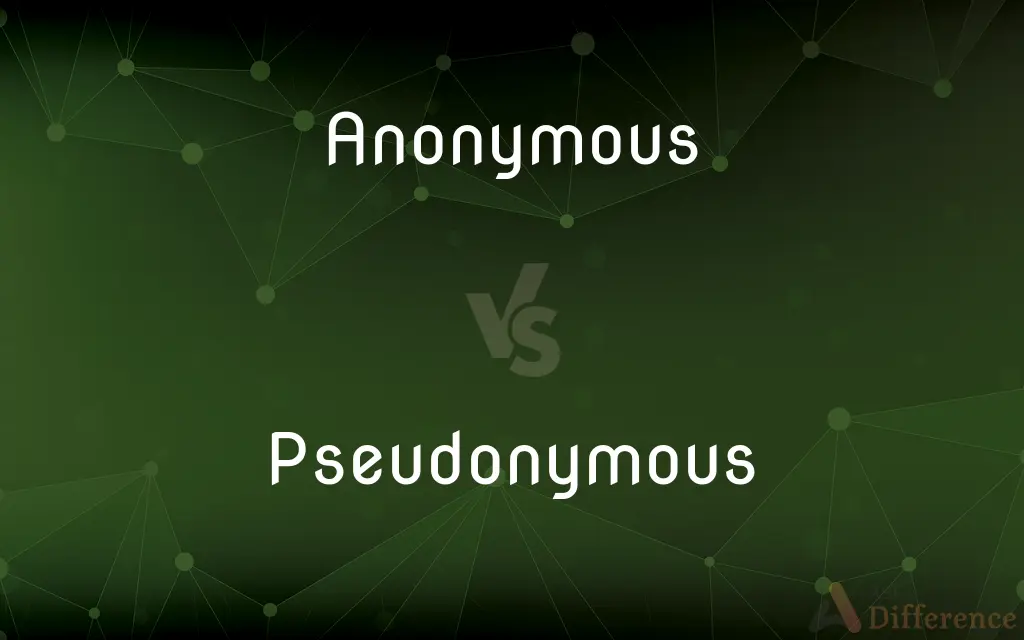Anonymous vs. Pseudonymous — What's the Difference?
By Tayyaba Rehman & Urooj Arif — Updated on April 5, 2024
Anonymous communication lacks identifiable personal information, while pseudonymous involves a consistent false identity, preserving some level of accountability.

Difference Between Anonymous and Pseudonymous
Table of Contents
ADVERTISEMENT
Key Differences
Anonymous and pseudonymous communications represent two approaches to privacy and identity on the internet. Anonymity allows individuals to interact without revealing any personal information, making it nearly impossible to trace the communication back to the individual. This can be crucial for protecting privacy in sensitive situations, such as whistle-blowing or political dissent. Pseudonymous communication, on the other hand, involves the use of a consistent false identity or pseudonym, which can create a level of accountability and reputation without disclosing the individual's true identity.
While anonymous users leave no traceable link to their real-world identity, pseudonymous users build a trackable history tied to their pseudonym. This distinction significantly impacts the nature of trust and credibility online. Anonymous postings are often met with skepticism due to the lack of accountability, whereas pseudonymous users can establish credibility over time based on the history of their contributions under a consistent alias.
In terms of privacy, anonymity offers a higher degree of protection since it leaves no clues to the user's identity. However, pseudonymity provides a balance between privacy and accountability, allowing users to engage in online communities with a persistent identity without revealing their real name. This can be particularly valuable in environments where trust and reputation are important.
From a legal perspective, the difference between anonymity and pseudonymity can also have implications. Law enforcement agencies might find it more challenging to trace anonymous communications back to the source, while pseudonymous accounts, with their activity logs and associated data, can sometimes be linked back to an individual through investigative means.
Despite their differences, both anonymity and pseudonymity serve important roles in online discourse. They allow individuals to express themselves freely, participate in sensitive discussions, and interact with communities without the fear of personal repercussions, all while offering varying degrees of privacy and accountability.
ADVERTISEMENT
Comparison Chart
Identity Disclosure
No personal information revealed
False identity used but consistent
Accountability
None, as the user cannot be traced
Possible through the history of the alias
Privacy Level
High, with no link to real-world identity
Moderate, as actions can be linked to the pseudonym
Trust and Credibility
Often low due to lack of accountability
Can be established over time through consistent contributions
Legal and Investigative Tracing
More challenging for authorities to trace
Easier to investigate due to consistent alias use
Compare with Definitions
Anonymous
Lacking identifiable personal information.
Posting anonymously online ensures the user’s real identity remains hidden.
Pseudonymous
Using a consistent false identity for communication.
Publishing under a pseudonym can protect an author’s privacy while building a reputation.
Anonymous
Can facilitate freedom of expression.
Anonymous reporting systems can help in whistleblowing without fear of retribution.
Pseudonymous
Allows for traceable and accountable interactions.
Pseudonymous reviews help maintain accountability and trustworthiness.
Anonymous
Not traceable to an individual.
Anonymous feedback can encourage honesty but makes follow-up difficult.
Pseudonymous
Offers a layer of privacy protection.
Pseudonymous participation in forums allows for honest discussion without revealing true identity.
Anonymous
Used to protect privacy in sensitive matters.
Anonymous sources are often used in journalistic investigations.
Pseudonymous
Balances privacy with online presence.
Pseudonymous social media accounts can discuss sensitive topics safely.
Anonymous
Allows for unaccountable communication.
Anonymous comments may increase the spread of misinformation.
Pseudonymous
Can establish credibility over time.
A pseudonymous blogger can become an authority in their niche.
Anonymous
Having an unknown or unacknowledged name
An anonymous author.
Pseudonymous
A fictitious name, especially a pen name.
Anonymous
Having an unknown or withheld authorship or agency
An anonymous letter.
Pseudonymous
Of or pertaining to a pseudonym.
Anonymous
Having no distinctive character or recognition factor
"They were carried over a bridge above an anonymous parade of shops" (Elizabeth Speller).
Pseudonymous
(of a name) Fictitious.
Anonymous
(not comparable) Lacking a name; not named, for example an animal not assigned to any species.
Pseudonymous
That uses a pseudonym.
Anonymous
(not comparable) Without any name acknowledged of a person responsible
An anonymous pamphlet
An anonymous subscription
Anonymous author
Pseudonymous
Pertaining to pseudonymization.
Anonymous
(not comparable) Of unknown name; whose name is withheld
An anonymous author
An anonymous benefactor
No customer personal data will be retained unless it is rendered anonymous.
Pseudonymous
Bearing a false or fictitious name; as, a pseudonymous work.
Anonymous
Lacking individuality.
An anonymous office block in a soulless industrial estate
Pseudonymous
Bearing or identified by an assumed (often pen) name;
The writings of Mark Twain are pseudonymous
Anonymous
Nameless; of unknown name; also, of unknown or unavowed authorship; as, an anonymous benefactor; an anonymous pamphlet or letter.
Anonymous
Having no known name or identity or known source;
Anonymous authors
Anonymous donors
An anonymous gift
Anonymous
Not known or lacking marked individuality;
Brown anonymous houses
Anonymous bureaucrats in the Civil Service
Common Curiosities
What does pseudonymous mean?
Pseudonymous refers to the use of a false but consistent identity in communications.
What is anonymity?
Anonymity involves interactions where the user’s personal information is completely hidden.
Can pseudonymous users be traced back to their real identity?
Potentially, through investigative means linked to the history of their pseudonym’s activities.
Is anonymity or pseudonymity better for online privacy?
Anonymity offers more privacy, whereas pseudonymity balances privacy with accountability.
Why is trust harder to establish with anonymous communication?
Because there’s no accountability or history to verify the credibility of the source.
How does pseudonymity differ from anonymity in online interactions?
Pseudonymity allows for a traceable history under a consistent alias, unlike anonymity.
How do online platforms typically handle anonymous vs. pseudonymous users?
Policies vary, but pseudonymous users may gain more trust and privileges over time.
Can an anonymous user become pseudonymous?
Yes, if they start using a consistent pseudonym for their communications.
What are the benefits of pseudonymity over anonymity?
It allows for building trust and reputation while maintaining a level of privacy.
Why might someone use a pseudonym in professional settings?
To separate their professional work from their personal life or to protect against bias.
Why might someone choose to be anonymous?
To protect their privacy, especially in sensitive or controversial discussions.
How do pseudonymous users build credibility?
Through consistent and valuable contributions tied to their pseudonym.
Are there risks associated with anonymous online activity?
Yes, including the spread of misinformation and lack of accountability.
Can legal actions be taken against pseudonymous individuals?
Yes, if their real identity is uncovered and they’ve engaged in unlawful activities.
How do anonymity and pseudonymity impact online communities?
They influence the dynamics of trust, engagement, and openness within the community.
Share Your Discovery

Previous Comparison
Opera vs. Movie
Next Comparison
Dessert vs. CoupeAuthor Spotlight
Written by
Tayyaba RehmanTayyaba Rehman is a distinguished writer, currently serving as a primary contributor to askdifference.com. As a researcher in semantics and etymology, Tayyaba's passion for the complexity of languages and their distinctions has found a perfect home on the platform. Tayyaba delves into the intricacies of language, distinguishing between commonly confused words and phrases, thereby providing clarity for readers worldwide.
Co-written by
Urooj ArifUrooj is a skilled content writer at Ask Difference, known for her exceptional ability to simplify complex topics into engaging and informative content. With a passion for research and a flair for clear, concise writing, she consistently delivers articles that resonate with our diverse audience.
















































